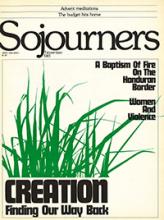The following was written by a North American church person and friend of Sojourners who witnessed the crossing of Salvadoran refugees into Honduras in March.--The Editors
The waters of the Rio Lempa divide the dry hills of Lempira, Honduras, from Cabanas, El Salvador; waters no wider than a stone's throw across to the other shore and just deep enough to reach over the head of a man or woman. On both sides of the river the hills rise sharply to a crest; cliffs and trees jut out into the water to offer protection from the sun.
Further to the west flow the waters of the Rio Sumpul, where 10 months ago 600 refugees fleeing from the repression in Chalatenango, El Salvador, were massacred in the span of six hours by the Salvadoran Security Forces. Honduran troops turned back those refugees who managed to cross the river. Children were thrown up into the air as targets and shot. Some were bayoneted. Women carried babies and other children who died in their arms. Few survived. And those who did cannot forget. Esperanza told me this morning she dreamed again of Sumpul. A Salvadoran My Lai.
Who would have believed it! Today, in the Rio Lempa, 4,000 refugees crossed over. Wednesday, March 18. In the darkness of the dawn hours they began to cross, cautiously. Now the hills are filled with men, women, and children--above all, children. Cries fill the air. Men and women in the river pass children over their shoulders to the other side. Everywhere shouts, mortar fire on both sides of the river. Then in the sky, a helicopter. Shots of machine-gun fire and several sweeps over the river. Unmistakable signs of a Salvadoran helicopter and the Security Forces. Rush to safety behind the cliffs and trees, then back to the river. Hundreds crossing. Everywhere cries fill the air. A baptism by fire.
40 days in the desert
Read the Full Article

